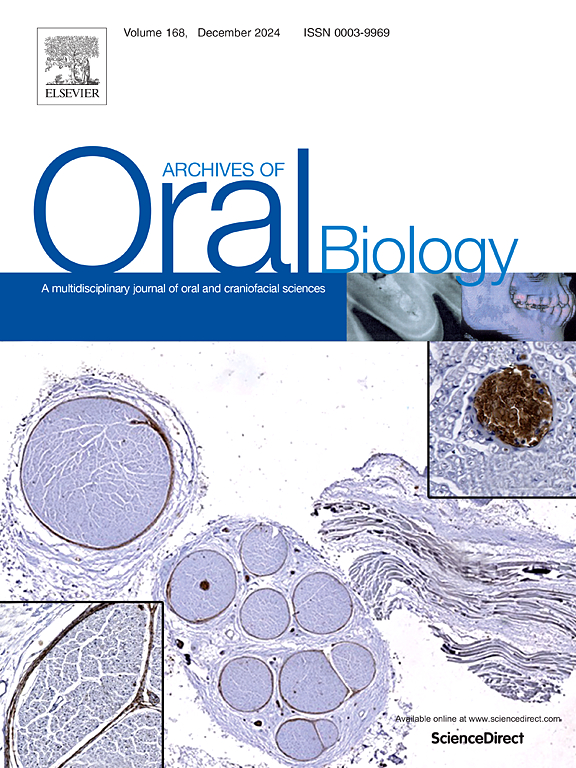Efficacy of combining soluble calcium and pyrophosphate with sodium fluoride in inhibiting enamel caries progression: An in vitro study
IF 2.2
4区 医学
Q2 DENTISTRY, ORAL SURGERY & MEDICINE
引用次数: 0
Abstract
Objective
This study aimed to compare the effects of a combination of sodium fluoride, soluble calcium, and pyrophosphate (FCaP) versus fluoride alone in inhibiting enamel caries progression.
Design
Different FCaP solutions were prepared, and two were selected for testing (FCaP-1: F = 76 mmol/L, Ca = 7.6 mmol/L, P = 7.6 mmol/L, FCaP-5: F = 76 mmol/L, Ca = 23 mmol/L, P = 23 mmol/L). Fluoride solution (F = 76 mmol/L) was used as a control. Fluoride and calcium bioavailability in the solutions were measured, and NMR analysis was used to identify fluorine-containing complexes. Sound bovine enamel samples (n = 24 / group) underwent a 4-day pH cycling protocol followed by an additional 3 days of demineralization. Micro-hardness testing and fluoride concentration measurements were performed.
Results
FCaP-1 and FCaP-5 demonstrated nearly 100 % fluoride and calcium bioavailability. NMR analysis confirmed the formation of fluorine-containing complex. Enamel treated with FCaP-5 exhibited significantly less reduction in subsurface hardness after pH cycling and additional demineralization compared to fluoride alone. Interestingly, fluoride concentration and acid resistance on enamel surfaces treated with FCaP-5 was lower than with fluoride alone (Steel’s multiple comparison test, p < 0.05).
Conclusions
FCaP effectively inhibits caries progression in subsurface enamel layers under pH cycling conditions by providing bioavailable calcium, indicating that FCaP increases the effectiveness of fluoride in caries management. FCaP may be a valuable addition to clinical practice, particularly for improving the effectiveness of fluoride-containing oral care products in individuals with low salivary calcium levels.
将可溶性钙和焦磷酸盐与氟化钠结合使用对抑制珐琅质龋齿发展的功效:体外研究。
目的:本研究旨在比较氟化钠、可溶性钙和焦磷酸盐(FCaP)联合使用与氟化单独使用在抑制牙釉质龋齿进展方面的效果。设计:不同FCaP解决方案准备,两个被选为测试(FCaP-1: F = 76 更易与L, Ca = 7.6 更易与L P = 7.6 更易与L, FCaP-5: F = 76 更易与L, Ca = 23 更易与L P = 23 更易/ L)。氟溶液(F = 76 mmol/L)作为对照。测定了溶液中氟和钙的生物利用度,并用核磁共振分析鉴定了含氟配合物。健全的牛牙釉质样品(n = 24 /组)进行了4天的pH循环方案,然后进行了另外3天的脱矿。进行显微硬度测试和氟化物浓度测定。结果:FCaP-1和FCaP-5的氟和钙的生物利用度接近100% %。核磁共振分析证实了含氟配合物的形成。与单独使用氟化物相比,使用FCaP-5处理的牙釉质在pH循环和额外脱矿后,其表面下硬度的降低幅度明显较小。有趣的是,FCaP-5处理的牙釉质表面的氟化物浓度和耐酸性低于单独使用氟化物(Steel's多重比较试验,p )。结论:FCaP通过提供生物可用钙有效抑制pH循环条件下牙釉质下层的龋齿进展,表明FCaP增加了氟化物治疗龋齿的有效性。FCaP可能是临床实践的一个有价值的补充,特别是在提高含氟口腔护理产品对唾液钙水平低的个体的有效性方面。
本文章由计算机程序翻译,如有差异,请以英文原文为准。
求助全文
约1分钟内获得全文
求助全文
来源期刊

Archives of oral biology
医学-牙科与口腔外科
CiteScore
5.10
自引率
3.30%
发文量
177
审稿时长
26 days
期刊介绍:
Archives of Oral Biology is an international journal which aims to publish papers of the highest scientific quality in the oral and craniofacial sciences. The journal is particularly interested in research which advances knowledge in the mechanisms of craniofacial development and disease, including:
Cell and molecular biology
Molecular genetics
Immunology
Pathogenesis
Cellular microbiology
Embryology
Syndromology
Forensic dentistry
 求助内容:
求助内容: 应助结果提醒方式:
应助结果提醒方式:


